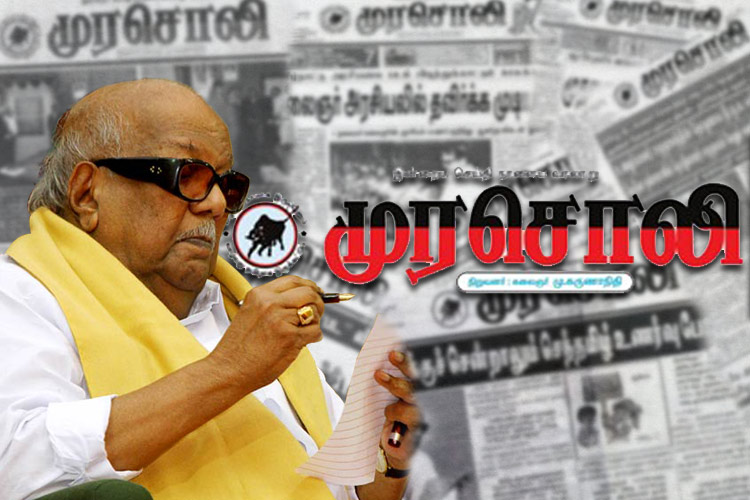

It goes without saying that a political career of 8 decades will generate more highlights than can be remembered. But one of the unique aspects of Karunanidhi’s time on TN’s political stage was his intimate relationship with the world of letters and the medium of print. He recognized, and wielded with great effect, the power of the newspaper.
Until recently, Karunanidhi was a regular visitor to the office of the Murasoli, the party’s official organ. Deeply attached to it, his visits were more frequent whenever he was out of power.
At some stage, Stalin took complete control of the newspaper, and the poor father had little say in anything. He was powerless even when those close to him, those he had respected, were removed for some reason or other. Still he would keep going there.
He would write columns, answer readers’ queries and so on. Even otherwise, while he was still able to, he liked to spend some time there, whenever he could.
It was Karunanidhi who had founded the newspaper and saw it rise to great heights, at least within the party ranks. He would claim that, when he was still in his teens, he would circulate hand-written pamphlets in his native town of Tiruvarur, and they duly morphed into the Murasoli (meaning the sound of the drums).
But during the Second World War, acute scarcity of paper prevented him from continuing his efforts. In the 50s it began to come out in print, by which time Karunanidhi had moved to Chennai and was somewhere near the top of the DMK.
The party boasted of a variety of publications at one time; founder CN Annadurai too headed one. In those days, the DMK would organise free reading rooms on many street corners wherein these publications would be available. Animated discussions would ensue between the people who gathered there, through which they would build bonds too. Thus, the periodicals played a key role in taking the ‘message’ to the masses at large.
But, come 1969, when Karunanidhi was elected Chief Minister, other publications gradually folded up, and the Murasoli was declared the official organ of the party!
The newspaper’s growth story perhaps reflects the defining characteristics of its founder –zealous, dedicated, immensely talented, and ruthless. He was not exactly Annadurai’s putative successor, but managed to maneuver his way to the top and slowly sideline all his senior colleagues. (The very man who is believed to have facilitated the ascent, MGR, was shown the door when he sought to assert his importance in the new scheme of things, and the AIADMK was born.)
If his hubris led to his fall, Karunandhi still managed to keep himself in the reckoning, keeping in touch with the ranks, touring the state, addressing public meetings and writing articles for the Murasoli. His open letters to the cadres, known in Tamil as Udanpirappu Kadithangal (letters to brothers), were sharp and delectable, and eagerly awaited by even those outside the party.
There was a time when this correspondent was somewhat close to Karunanidhi, and was even offered a job in the Murasoli. This was a time when the DMK regime found itself beleaguered, after Rajiv Gandhi and Jayalalithaa ganged up, eventually resulting in the dismissal of the government on specious grounds. So, any report, any analysis, raising questions on the opposition’s tactics, was warmly welcome.
But when I attacked the DMK on some other issues much later, Karunanidhi became so incensed that he carried a caricature in the Murasoli implying that I was on the payroll of the Poes Garden (where Jayalalithaa was residing).
That said, one should readily admit that mediapersons enjoyed his stints as the Chief Minister, because he was both accessible and articulate. Even rookies could call him at odd hours and hope to get some response or other. Never did he fight shy of fielding queries, and his pressers were a matter of great delight since he had the gift of the gab, typical of many early Dravidian leaders.
Especially since he alternated with the ever aloof and haughty Jayalalithaa, his reigns came as breath of fresh air to which we would all look forward eagerly. But he was also adept at deflecting with ease even the most uncomfortable questions, many times seeking to turn the tables on the questioners themselves.
For instance, when the Dravidar Kazhagam (DK) was stonewalling all attempts by other outfits to re-publish Periyar EVR’s works, Karunanidhi was asked why his government would not nationalize the collection; such a move takes away the copyright and had many a time been resorted to by him. Commentators were panning him for being indifferent, obviously because he would not do anything to displease his ally K Veeramani, the president of the DK.
But an unfazed Karunanidhi shot back, “Did you object when writer Kalki’s family objected to the nationalization of his works?” There was laughter all round, as he was slyly hinting that the reporter asking the question, being a Brahmin, conveniently kept quiet when it came to fellow Brahmins.
The Chief Minister was actually dodging the question. But the Brahmin barb hit the target. The reporter was embarrassed, and others around him chose to move on to other issues. Indeed the issue itself was given a decent burial with that repartee.
Karunanidhi’s son Stalin, who has already taken over the party, has no literary inclinations whatsoever, and is not very accessible either. For that matter, none of the second generation Dravidian leaders, barring a few, have cared much for either ideology or history.
To think that Karunanidhi found the time amidst his political career to write commentaries on ancient Tamil literary works like Tholkappiam (a very difficult grammar classic) and the Thirukkural (an iconic collection of couplets outlining the virtues of the Tamil way of life). His literary flair will be sorely missed in Tamil politics in the days to come.